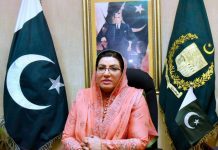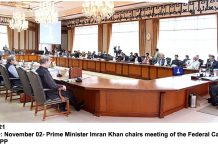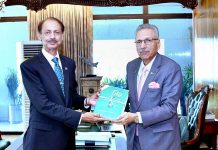مضمون کا ماخذ : آن لائن لاٹری پاکستان
Moot calls for making students partners in growth and development
Students are at the core of every university but are often excluded from decisions on campus life, teaching and learning initiatives, and gender equity programmes, according to students, teaching faculty and public intellectuals at Parwaaz, the Aga Khan University’s three-day inaugural conference on the student experience. “Higher education is often portrayed as being a journey […]
Students are at the core of every university but are often excluded from decisions on campus life, teaching and learning initiatives, and gender equity programmes, according to students, teaching faculty and public intellectuals at Parwaaz, the Aga Khan University’s three-day inaugural conference on the student experience.
“Higher education is often portrayed as being a journey of discovery that is unique to each student,” said Yasira Hussain, a final year nursing student and part of the conference’s organising committee. “But students rarely have a chance to influence what goes on around them and are often the last to know about ideas that impact the campus,” she said. “We would like to encourage all higher education institutions to think of students as partners and co-creators of the university experience,” she suggested.
A prominent theme at the conference was the impact of the design of academic spaces on student engagement. Haider Saleem, a medical student and student lead for the conference, highlighted the importance of open spaces on campus to bring students together. He also noted that campuses that maximise the number of auditoriums and classrooms rarely feel welcoming to the students.
Saleem also commented on how the classic set-up of classrooms – boards upfront, benches behind – could be changed to enhance student learning. “Seating students on circular tables would facilitate discussions enabling them to learn from questions asked by peers and to assess how well they are learning on group projects,” he noted.
“Design changes also need to be supported by reforms in teaching and learning practices. Moving lectures online enables students to learn on their own time and to keep class time for engaged discussion rather than note-taking,” he said. “Today’s youth has grown up in the information age and are used to getting immediate answers. That’s why multimedia facilities that display the latest updates should be at the centre of the classroom experience instead of textbooks with yesterday’s knowledge,” he added.
Speaking at the conference, Safdar Abidi, a well-known international architect who has designed a number of universities in Canada such as Ryerson University and campuses of the University of Toronto, said, “Analysis, critical thinking, collaboration and testing of ideas requires student-centred spaces where people can gather in a wide variety of configurations to jointly convert information into learning and knowledge.”
Students at the conference stated that universities could impart a truly meaningful education by focusing on developing lively minds rather than lucrative careers. “Most universities encourage students to look outward by exposing them to the expertise of others through books, lectures and seminars that will help them in their chosen career,” said Dr Aisha Sanober, a fellow in psychiatry and a co-chair of the conference. “A truly wholesome student experience encourages them to also look inwards and develop their potential and character by stepping outside their comfort zone. This approach widens a student’s perspective and makes them think about how to make an impact beyond their chosen profession.”
In his keynote speech titled ‘Being Young in Pakistan’, Adil Najam, founding dean of the Pardee School of Global Affairs in Boston and former vice-chancellor of LUMS, spoke about the measures needed to help students achieve their potential. He noted that most of Pakistan’s youth lacked access to sports facilities, libraries and adequate public transport that enable them develop all aspects of their personality. He emphasised that Pakistan’s ‘youth bulge’ presented it with enormous opportunities as he urged decision makers to listen to the voices of the young and to engage with them.
“The fact of the matter is that the youth of Pakistan are heard shouting so often because they do not feel that their voice is being heard,” Najam said. “The young in Pakistan are not a problem to be solved. They are an opportunity to be nurtured. Give them three things: quality education, gainful employment and meaningful engagement and they will give you the world.”
Aimen Lakhani, an MPhil student and part of the conference organising committee, said, “Universities need to think about creating safe, inclusive spaces where all learners regardless of their gender, age or ethnicity can engage in interdisciplinary activities. These activities foster teamwork, creativity, critical thinking and social responsibility and enable students to think beyond their professional goals and to focus on the big picture.”
Conference Chair Dr Ayesha Mian, Dean of Students at AKU, said, “The goal of Parwaaz is to catalyse the conversation around student experience in higher education. Students should be seen as co-creators of this crucial period of their lives and we must empower them now so that they are confident about shaping our country’s future.”
The three-day conference consists of a hackathon, workshops on enhancing campus experience and a festival that saw participants interact with youth leaders and influencers to jointly design initiatives for a student-centred university experience.
Published in Daily Times, November 25th 2018.












